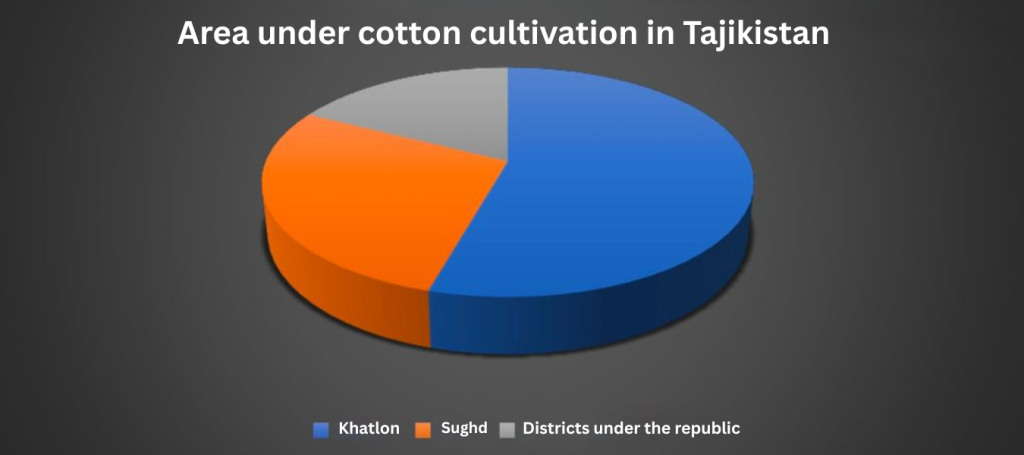Cotton holds a pivotal position in Tajikistan’s economy, serving as one of the country’s most significant agricultural exports and a critical source of income for rural populations. Approximately 20% of the population relies on cotton cultivation, which contributes around 10% to the nation’s GDP in 2024. With this vital sector at its core, Tajikistan has been actively developing its domestic textile industry to transform raw cotton into finished products, thereby adding value and creating employment opportunities.
Cotton Production and Export Statistics
Tajikistan cultivates cotton on approximately 200,000 hectares of land, yielding over 420,000 tons of cotton annually. Of this, around 25,000 tons are processed domestically while the remainder is exported. In 2025, the cultivated area increased by 60% compared to the previous year, with major cultivation concentrated in Khatlon (60%), Sughd (30%), and the Rasht Valley (10%).
In 2024, Tajikistan exported about 30,000 tons of cotton worth $56 million, primarily to Turkey, China, Portugal, Uzbekistan, Italy, Russia, and Croatia. Total exports of cotton, silk, and other textile products exceeded $250 million, with raw cotton exports comprising $95 million of this figure.
Challenges and Strategic Developments in the Textile Industry
Despite favorable climatic conditions and rising global demand for cotton products, the Tajik textile sector faces significant hurdles such as outdated technology, insufficient infrastructure, limited financing, and restricted market access. To address these challenges, the government is investing in infrastructure upgrades, technological modernization, and market diversification. There is also a concerted effort to improve labor conditions, provide healthcare and education, and address child labor and gender inequality within the sector.
Tajikistan aims to reduce its reliance on raw cotton exports by promoting full-cycle textile production within the country. Foreign investors are being encouraged to establish vertically integrated facilities that can process cotton fibers into finished textile products, leveraging modern technologies.
Key Textile Enterprises in Tajikistan
- Pilla Tajik (Dushanbe): A major player in silk and textile production, equipped with advanced facilities for processing silk cocoons into yarn and fabrics such as ‘Atlas’ and ‘Adras’. It employs over 300 workers and boasts an annual capacity of over 60 tons of silk yarn.
- Satin (Khujand): Partnered with Italian investors, Satin specializes in spinning, dyeing, weaving, and garment production with strict quality controls. It exported over 299,000 units in the first four months of 2025 and employs around 200 people.
- Javoni (Khujand): This private company produces men’s, women’s, and children’s clothing, operating with modern equipment and employing 750 workers across three shifts. It exported products worth over 36.7 million somoni in 2024, with key markets including Russia, Italy, and Croatia.
- Arvis (Dushanbe): Focused on producing towels and woolen products, Arvis has a capacity to process 3,600 tons of cotton yarn annually and employs 600 people. The company sources advanced machinery from Germany, Belgium, Japan, Turkey, and South Korea to ensure high-quality production standards.
- Atlantis Factory (Khujand): Specializing in the automated production of ‘Atlas’ and ‘Adras’ fabrics, the factory can produce 60 types of Atlas and 30 types of Adras fabrics with a workforce of 100 employees.
Future Outlook
Tajikistan’s textile industry holds significant potential for growth, provided that investments in modernization and infrastructure continue. By shifting towards full-cycle production and enhancing value-added processes, Tajikistan is positioning itself as a competitive player in the regional and global textile markets. With government support and foreign investment, the sector could emerge as a key pillar of the national economy, offering sustainable employment and contributing to economic diversification.
































